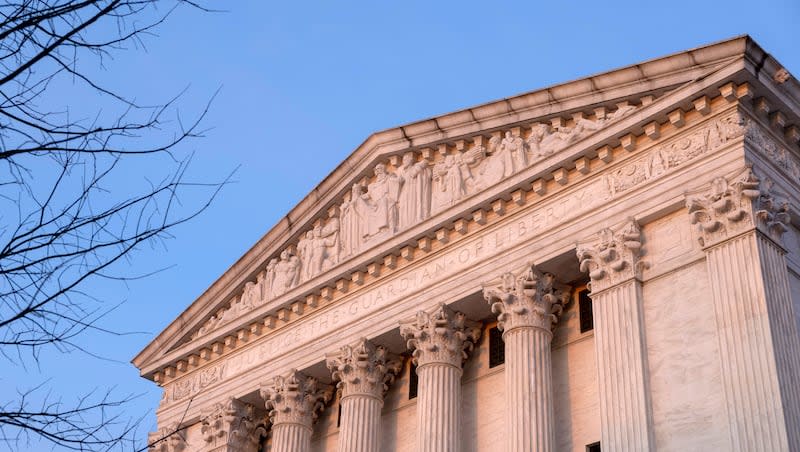The Supreme Court case on Trump’s presidential immunity, explained

- Oops!Something went wrong.Please try again later.
Can former President Donald Trump be prosecuted in a case accusing him of plotting to overturn the 2020 election results?
The Supreme Court will take up that question Thursday in Donald J. Trump v. United States, a case that could affect not only Trump’s election interference trial but also the 2024 election, as the Deseret News previously reported.
Here’s everything you need to know about the Supreme Court case on presidential immunity:
The criminal trial
On Aug. 1, 2023, Trump was indicted on four felony counts for his efforts to overturn the 2020 election, including charges of witness tampering and conspiracy to defraud the U.S. government, The Associated Press reported. Special counsel Jack Smith, who is overseeing the federal prosecution, spent several months investigating Trump following the Jan. 6, 2021, riot.
Trump is the first former president to face criminal charges.
Trump filed a motion to dismiss the criminal charges against him, claiming he can’t be “prosecuted for his official acts as president and that a former president cannot be prosecuted unless he has first been impeached by the House and convicted by the Senate,” according to SCOTUSblog. U.S. District Judge Tanya Chutkan denied Trump’s motion.
The judge had initially set the trial date for March 4, but the trial has been put on hold until the high court rules on Trump’s claim of presidential immunity.
The lower court rulings
Both a federal district court and the D.C. Circuit both upheld upheld Chutkan’s decision, rejecting Trump’s claim of presidential immunity.
In the appeals court ruling in February, a three-judge panel stated that for purposes of this case, “former President Trump has become citizen Trump, with all of the defenses of any other criminal defendant,” per The Associated Press.
The question of presidential immunity now heads to the Supreme Court. The court will answer the question of “whether and if so to what extent does a former President enjoy presidential immunity from criminal prosecution for conduct alleged to involve official acts during his tenure in office,” the Supreme Court’s filing reads.
The oral arguments
Oral arguments will begin at 8 a.m. MDT on Thursday, April 25.
Trump’s lawyers have argued that a ruling against him would affect a sitting president’s ability to effectively perform the job of president.
“From 1789 to 2023, no former, or current, president faced criminal charges for his official acts — for good reason,” Trump’s attorneys wrote in an opening brief to the Supreme Court. “The President cannot function, and the Presidency itself cannot retain its vital independence, if the President faces criminal prosecution for official acts once he leaves office.”
Prosecutors, on the other hand, argue that the the president does not have absolute immunity from prosecution and that the lack of historical precedent “underscores the unprecedented nature” of Trump’s conduct.
“No presidential power at issue in this case entitles the president to claim immunity from the general federal criminal prohibitions supporting the charges: fraud against the United States, obstruction of official proceedings, and denial of the right to vote,” prosecutors’ brief to the Supreme Court reads. “The president’s constitutional duty to take care that the laws be faithfully executed does not entail a general right to violate them.”
CBS News noted that prosecutors argued in their brief “that even if the high court were to find that some immunity could be extended to a former president’s ‘official acts’ while in office, that would not preclude Trump’s prosecution.” The criminal charges against Trump involved a “private scheme with private actors to achieve a private end: petitioner’s effort to remain in power by fraud,” the prosecutors wrote.
The stakes
If the court rules in favor of Trump, deciding that a former president is entitled to absolute immunity, special counsel Smith’s federal criminal case against him would be dropped.
If the court rules against Trump, the trial against him would proceed, “though it’s unclear whether a trial could be held before the November presidential election,” according to CBS News.
If the trial proceeds, Trump is seeking to “push it back ... until after the election, when, if he were to regain the presidency, he could order the Justice Department to drop the case,” The Associated Press reported.
The court is expected to hand down its decision in late June.

